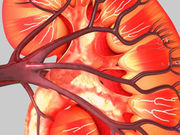Genes involved in metabolic and solute transport function linked to treatment failure in PD-L1+ RCC
THURSDAY, Aug. 4, 2016 (HealthDay News) — Tumor cell-intrinsic metabolic factors may contribute to anti-programmed death 1 (PD-1)/PD-L1 treatment resistance in renal cell carcinoma (RCC), according to a study published online Aug. 4 in Cancer Immunology Research.
Maria Libera Ascierto, Ph.D., from the Johns Hopkins University School of Medicine in Baltimore, and colleagues examined mechanisms underlying the failure of PD-1-targeted therapies in patients with advanced RCC whose tumors express PD-L1. The authors derived formalin-fixed, paraffin-embedded pretreatment tumor biopsies expressing PD-L1 from 13 patients. RNA from PD-L1+ regions was subjected to whole genome microarray and multiplex quantitative real-time polymerase chain reaction gene expression analysis.
The researchers found that, following anti-PD-1 therapy, the balance between gene expression profiles reflecting metabolic pathways and immune functions correlated with clinical outcomes. In patients with PD-L1+ RCC, expression of genes involved in metabolic and solute transport functions correlated with treatment failure. Tumors from patients who responded to treatment overexpressed immune markers, including BACH2, which regulated CD4+ T cell differentiation, and CCL3, which was involved in leukocyte migration.
“These findings suggest that tumor cell-intrinsic metabolic factors may contribute to treatment resistance in RCC, thus serving as predictive markers for treatment outcomes and potential new targets for combination therapy regimens with anti-PD-1,” the authors write.
Several authors disclosed financial ties to pharmaceutical companies, including Bristol-Myers Squibb, which funded the study.
Copyright © 2016 HealthDay. All rights reserved.








